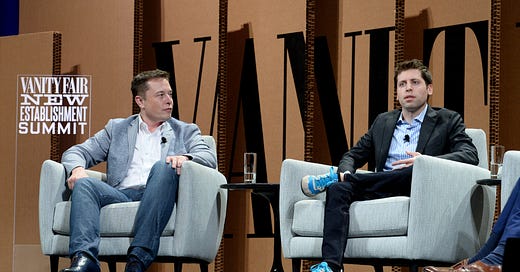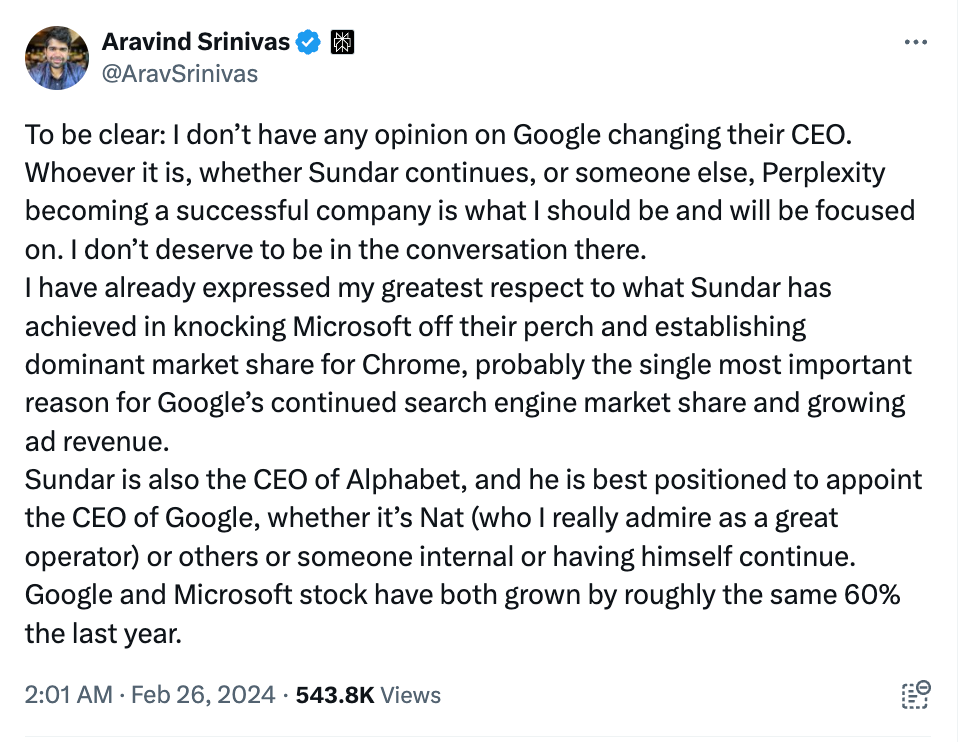Musk Sues Altman...Google's Search Rivals See an Opening…A Shakeup in AI Rankings
Plus, Apple scraps its electric car plans
The Main Item
Musk: OpenAI Breached Non-Profit Promise
Hi, it’s Eric.
Elon Musk sued OpenAI and OpenAI co-founders Sam Altman and Greg Brockman Thursday night.
After Musk’s failed battle not to buy Twitter, I’m surprised he’s so eager to get back into a legal tussle. Though knowing Musk’s appetite for headlines, maybe I shouldn’t be.
This battle will again pit Musk against Bret Taylor, the former Twitter board chair and a freshly installed chairman of OpenAI’s non-profit board of directors.
But this time, it feels like Musk may have a better case. Musk alleges that he funded OpenAI as a non-profit entity and that the company turned around and ruthlessly pursued a profit motive, working with the most valuable company in the world, Microsoft.
Under its new Board, [OpenAI] is not just developing but is actually refining an AGI to maximize profits for Microsoft, rather than for the benefit of humanity. Its technology, including GPT-4, is closed-source primarily to serve the proprietary commercial interests of Microsoft. Indeed, as the November 2023 drama was unfolding, Microsoft’s CEO boasted that it would not matter “[i]f OpenAI disappeared tomorrow.” He explained that “[w]e have all the IP rights and all the capability.” “We have the people, we have the compute, we have the data, we have everything.” “We are below them, above them, around them.”
Musk argues a couple of important points in his lawsuit: (1) GPT-4 is really artificial general intelligence, given that it’s smarter than most humans on a number of tasks, (2) OpenAI has an incentive to keep denying that it has achieved AGI so that it can keep pursuing profits under its complicated organizational structure, and (3) that if OpenAI’s non-profit-turned-for-profit-hybrid model is allowed to stand, its tax advantageous structure will become commonplace.
Musk’s suit:
Given Microsoft’s enormous financial interest in keeping the gate closed to the public, OpenAI, Inc.’s new captured, conflicted, and compliant Board will have every reason to delay ever making a finding that OpenAI has attained AGI. To the contrary, OpenAI’s attainment of AGI, like “Tomorrow” in Annie, will always be a day away, ensuring that Microsoft will be licensed to OpenAI’s latest technology and the public will be shut out, precisely the opposite of the Founding Agreement.
Back when everyone in the world seemed to be cheering for Altman to be reinstated as CEO of OpenAI, I wrote a warning about reinstating Altman with unchecked power. One of the fractious breakups that I cited in Altman’s under-explored history was with Musk.
This lawsuit, if Musk sticks with it, could be a looming threat to OpenAI for years. The lawsuit cuts to some of the core questions around OpenAI: its governance structure, whether it has reached AGI, the company’s relationship with Microsoft, the propriety of its non-profit status, and how sensitive AI research should be conducted.
With reporting that the SEC is also investigating OpenAI, the company now seems to be under siege.
Apply to Our Fintech & Banking Summit
Our financial technology and banking conference, the Newcomer Banking Summit, is fast approaching. We’re hosting it on Thursday, March 14 in San Francisco. There are still a few spots. We’d love to have fintech founders, CFOs, tech bankers, and other financial executives apply.
Gunning for Google Search
AI Search Startups Come for Google Amid Gemini Debacle
Hey, it’s Madeline from here on.
When an upstart visionary has an idea that competes with Google Search, it typically ends in tears.
Despite all the complaints about Google Search’s degradation in an age of SEO word salads and advertising everywhere, the behemoth still controls over 90% of the search market. True, researchers say its share declined a little bit last year—from 93% to 91%—but Microsoft Bing’s OpenAI-powered search still sits at just over 3%. (Neeva, which shut down its search engine last summer and whose founder was just appointed CEO of Snowflake, is among the more recent failed rivals of the search king.)
But maybe it’s different this time. People are already using ChatGPT as a search engine despite its limitations and hallucinations. OpenAI is said to be working on its own search engine, partly powered by Bing.
And a handful of even newer AI-powered search startups are aiming to give Google a run for its money.
The search engine-for-enterprise firm Glean on Tuesday announced a $200 million Series D round, co-led by Kleiner Perkins and Lightspeed Venture Partners, at a post-money valuation of $2.2 billion. Glean lets its corporate customers search across all their workplace tech platforms while abiding by internal governance rules, meaning that only employees with access to certain files can see them.
Founded by ex-Googler and Rubrik co-founder Arvind Jain in 2019, Glean’s search engine has a much narrower focus than Google’s, and the company says it can provide clear and immediate value-add for its enterprise customers. This certainly made it more attractive to VCs who might otherwise have been wary of backing a consumer search startup. Some other AI search competitors, like Coveo, are also enterprise-focused.
I asked Jain about his advantage over the search incumbent players. He cited Microsoft’s Copilot, not Google, as the biggest incumbent.
“Search is evolving from the paradigm of putting words into the search box and finding 10 results to becoming more conversational,” Jain said. “You can only be conversational because of these AI models.’”
VCs are also betting big on Perplexity, which does position itself as more of a direct Google competitor. Perplexity says it is an “answer engine” rather than a search engine, because it synthesizes and summarizes its results for its customers. The one-year-old startup closed a $100 million round led by IVP at a $250 million valuation back in January, and has received unsolicited offers from VCs that would raise its valuation to more than $1 billion, The Information reported.
And when it comes to the underlying large language models (LLMs), the competition is also growing. Mistral AI unveiled its new Mistral Large model on Monday, and news broke that Microsoft had written a €15 million ($16.2 million) check to the company. The deal is currently facing scrutiny from EU regulators.
The fresh investment in competitors comes as Google faces a humiliating setback in its own generative AI efforts. CEO Sundar Pichai’s job could even be in danger after the company’s Gemini chatbot served up racially inaccurate images in response to prompts like “medieval king” and “founding fathers,” and showed other behaviors that lent support to allegations that a left-leaning internal culture is swaying product decisions.
Google apologized last Friday for the debacle, acknowledging the images were “missing the mark” in a statement on X. Internally, Pichai wrote in a memo that the errors were “completely unacceptable” and that teams were “working around the clock” to fix the issues.
It may be fun to kick Google while it's down. And certainly there is historical precedent for a search king being abruptly and brutally dethroned: see Google v. Yahoo.
Still, the cracks in Google’s armor may not be as big as its competitors want to believe. Perplexity CEO Aravind Srinivas on Monday walked back X posts that took a harsher tone towards Google, not wanting to offend the still-king-of-search.
His hedge underscores a truth of Silicon Valley: no one has come anywhere close to dethroning Google search in 25 years. It has surpassed even Microsoft’s old Windows as the longest-running monopoly in modern tech.
Jain won’t count his former teammates out, either, despite their “missteps,” as he put it.
“They have all the user attention, all the resources and amazing tech behind the scenes. They just need to bring it to market a little bit faster,” he said.








